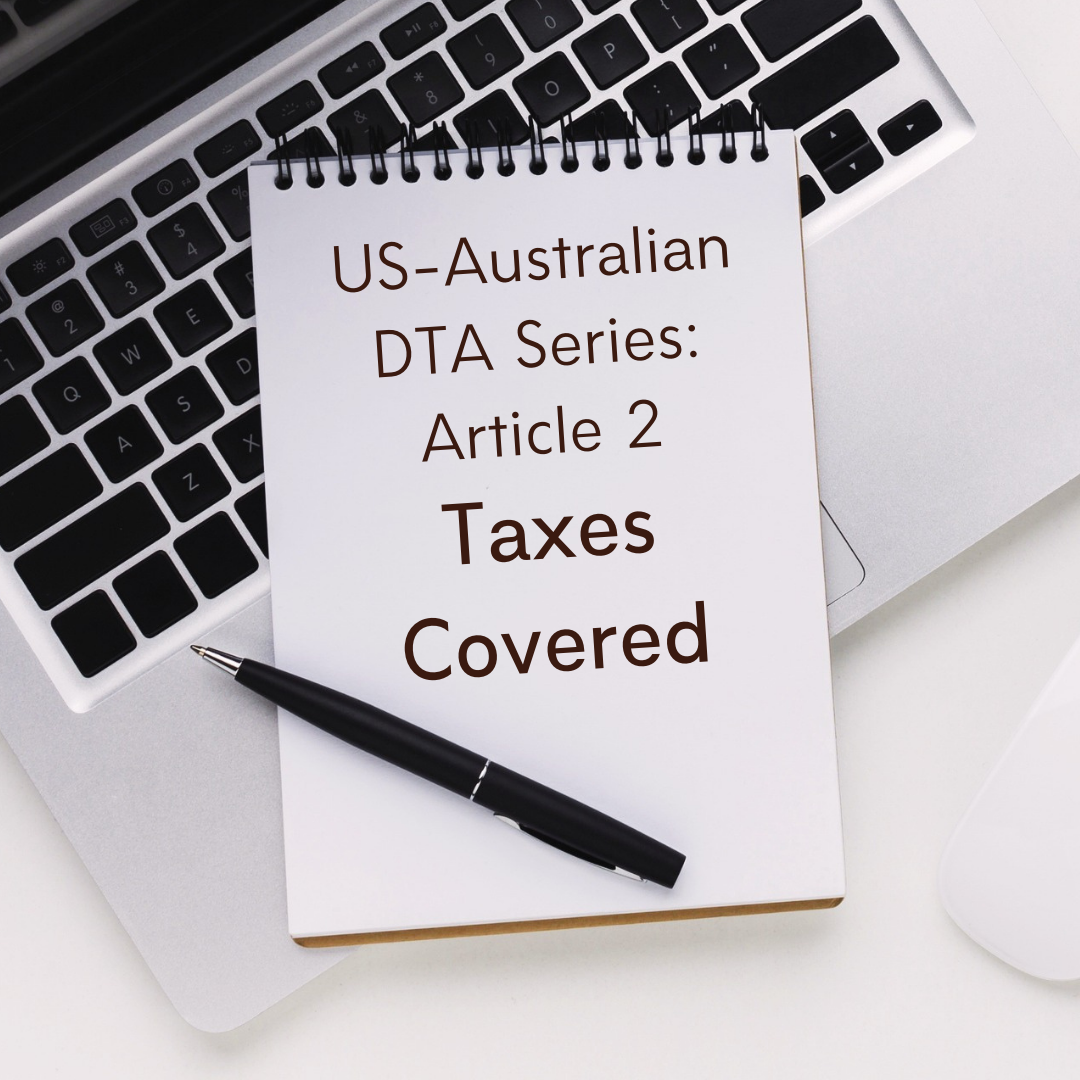
US-AU DTA: Article 2 – Taxes Covered
GENERAL BACKGROUND
Last week we discussed the scope and limitations of the DTA as set out in Article 1.
In this week’s blog, we will be discussing Article 2 of the DTA – Taxes Covered.
This DTA is for the avoidance of double taxation and the prevention of fiscal evasion concerning taxes on income.
It, therefore, does not include taxes that fall outside the scope of Article 2. For examples Gift and Estate, Taxes are covered in the Gift Tax and Estate Tax Treaty respectively.
INTRODUCTION
Article 2 is intended to make the terminology and nomenclature relating to the taxes covered by the DTA more acceptable and precise, to ensure identification of the US and Australian taxes are covered by this convention. Further to widen as much as possible the field of application of the DTA by including as far as possible and in harmony with the domestic laws of the US and Australia imposed and to avoid the necessity of concluding a new DTA whenever the domestic laws of either the US or Australia are modified.
Shaun the only point I would add is that to the extent that a DTA is silent then that item is taxed under domestic law. DTAs are not all-encompassing in that regard. Otherwise, it is good.
INTERPRETING ARTICLE 2 OF THE DTA – TAXES COVERED
Article 2 of the DTA states the following –
(1) The existing taxes to which this Convention shall apply are:
(a) in the United States: the Federal income taxes imposed by the Internal Revenue Code; and
(b) in Australia:
(i) the Australian income tax, including a tax on capital gains; and
(ii) the resource rent tax in respect of offshore projects relating to exploration for or exploitation of petroleum resources, imposed under the federal law of Australia.”.
(2) This Convention shall also apply to any identical or substantially similar taxes which are imposed by either Contracting State after the date of signature of this Convention in addition to, or in place of, the existing taxes. At the end of each calendar year, the competent authority of each Contracting State shall notify the competent authority of the other Contracting State of any substantial changes which have been made during that year in the laws of his State relating to the taxes to which this Convention applies or in the official interpretation of those laws or of this Convention.
Paragraph 1
US Taxes Covered –
Sub-paragraph (1)(a) of Article 2 provide that all U.S. income taxes are covered taxes for purposes of the Convention. Thus, the accumulated earnings tax and the personal holding company tax are also covered taxes because they are income taxes, and they are not otherwise excluded from coverage. Under the Code, these taxes will not apply to most foreign corporations because of either a statutory exclusion or the corporation’s failure to meet a statutory requirement.
The DTA excludes social security taxes and excise taxes, such as those imposed on private foundations and foreign insurers, from the taxes covered by the Convention.
Australian Taxes Covered –
Sub-paragraph (1)(b) of Article 2 provides that the covered taxes are the Australian income tax, including a tax on capital gains, and the resource rent tax in respect of offshore projects relating to exploration for or exploitation of petroleum resources (“RRT”), imposed under the federal law of Australia.
The specific reference to the Australian capital gains tax makes it clear that U.S. taxpayers receive a foreign tax credit for Australian capital gains taxes paid.
Concerning the RRT being covered Australian taxes mean that the provisions of the DTA, including Article 5 (Permanent Establishment), Article 7 (Business Profits), and Article 27 (Miscellaneous), generally will apply to the RRT.
However, the effect of the Protocol’s modification to Article 22 (Relief from Double Taxation) is that even though the RRT is a covered tax, the United States is not required by the Convention to grant a U.S. foreign tax credit for RRT paid to Australia. Whether the RRT is creditable therefore is determined under U.S. domestic law.
Paragraph 2
Under paragraph 2, the DTA will apply to any taxes that are identical, or substantially similar, to those enumerated in paragraph 1, and which are imposed in addition to, or place of, the existing taxes after the date of signature of the Convention. The paragraph also provides that the competent authorities agree to notify each other at the end of each calendar year of substantial changes in their income tax laws or the official interpretation of those laws or the Convention.
CONCLUSION
Ensure that you understand the taxes that are covered by this DTA. First and foremost, you need to identify the type of income generated before relying on the DTA.
It is important to note, that to the extent that a DTA is silent on a specific type of tax, that item is taxed under domestic law. DTAs are not all-encompassing in that regard.
The DTA only applies to US Federal Income Taxes, which implies that it does not extend to State taxes. You will therefore not be able to claim treaty relief for state taxes paid in the US.
Furthermore, Estate and Gift Taxes are covered in separate treaties and do not fall within the ambit of this DTA.
It will be interesting to see how the US and Australia interpret the taxation of Cryptocurrencies in terms of the DTA. Even though there is sufficient coverage currently we might see some amendments soon.




